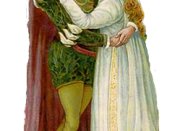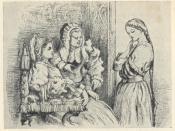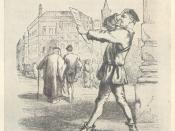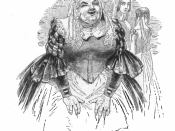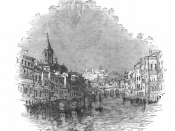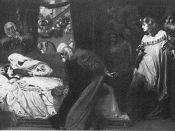By analysing use of language in Act III Scene 5 of Shakespeare's Romero and Juliet, show how he builds a sense of anxiety for his audiences. Evaluate the importance of this scene to the plot and suggest how at least one character might be directed Women played a completely different role in society in Elizabethan times than they do today. Wealthy upper class women like Juliet were expected to obey their father's wishes and marry at his command. Love was not a deciding factor in the marriages occurring between the rich. Fathers arranged marriages to obtain better links with certain important wealthy families and inherit money.
At the time, there was much debate in whether women should be allowed to take part in arranging marriages and their feelings considered. In the case of Juliet she was forced to marry when secretly she was already married to her true love Romero.
Juliet at the time fought passionately to stop the arranged marriage. This would be most unusual at the time for young women to fight back against her father's wishes. This event would have surprised and stunned the crowd watching.
This gives me the impression Shakespeare thought love should govern marriages not petty issues like money and positions in society. Perhaps the play had a secret revolutionary objective in changing the very structure on which society worked upon. Shakespeare may have written the play to try and change the way marriages occurred in the classes. The play includes so much lust, passion, and love, he might have included these elements in attempt to show people how valuable and what a good thing love is. He wanted people to let love run its course instead of interfering like in the case of Romero and Juliet that ended in utter tragedy on the star-crossed lovers, and the realisation of the Capulet's that it was their actions that brought about this terrible event among others.
In this essay, I aim to express how Shakespeare uses language in act 3 scene 5 to give a growing emotion of anxiety for the audience throughout the play. In addition, I will relate to how important this scene is compared to the rest of the play and how two characters could be directed.
This scene is very important to the plot of the play. It represents a change in emotions and you can clearly see Romero and Juliet's relationship heading downhill to calamity.
Up to this scene the play has been mainly about the beginning of a relationship between the two lovers its secrecy and the bond of marriage between them. This beautiful smooth tale of love and vows is shattered with the news Juliet is going to be married to the County Capulet who she hates. You also see in this scene the explosion of emotion as the calm tranquil love filled environment is broken by the terrible news. Juliet unsurprisingly acts very angry and battles in a duel of words with Lord Capulet. Lord Capulet also is extremely furious with Juliet's disobedience and reluctance to marry.
In this scene the lovers have to admit that the day is dawning and they must part or Romero will be captured and put to death for not going into exile under the decree of the Prince. After the high point of the lover's relationship, their love-making, everything in the scene starts to go wrong for them. The planned marriage is a real threat to the couples marriage continuing it leads on to coming events. Thus we could say that this scene seals the tragedy. It isolates Juliet, and with its ominous lines, dramatic irony, and a new twist to the plot, it hurries the play along the path begun in act 3 scene 1 with Tybalt's and Mercutio's deaths.
There is a strong sense of dramatic irony in this scene as the onlookers know Juliet is in love and married to her Romero, I can almost imagine the cries of the crowd in defence of Juliet in the great Globe Theatre. This scene will keep the audience gripped in the action and following every word. They would feel involved and the characters would come to life. Therefore this scene is vital to the course of the play.
Shakespeare uses the dialogue to great effect to bring the characters to life and build up atmosphere through out the scene. At the start of the scene Romero has not yet departed and the sun is rising the couple must say their fairwells. The atmosphere here is still love orientated and fairly calm however there is a growing element of suspense and fear. "I must be gone and live, or stay and die" says Romero very early in the scene, this starts to build suspense because if Romero is caught he will be killed. Juliet wants him to stay as long as possible "Yon light is not daylight", this line brings out futher the strong feelings of love they both share because they do not want to leave each others presence. The audience feels their love is very strong and true this helps them to feel for the characters bringing them to life. When Juliet says, "Hie hence be gone away!", there is a relief of tension in the audience, they fear for Romero's life as he is in grave danger the longer he stays.
There is a feeling of sadness in the atmosphere as our two passionate young lovers depart, "More light and light; more dark and dark our woes" this relates to the arrival of light and thus their separation. The mother like nurse then bursts into the fairwell scene shouting, "Madam" the atmosphere changes almost to panic, and this marks the end of the love in the air atmosphere of this scene as Romero has to quickly make his exit. Juliet at this moment is filled with misgivings, she fears that they will never meet again. Juliet's fears increase our fear that the tragedy is now gathering momentum, she prays, "I hope thou wilt not keep him long, but please send him back". There is a sad longing atmosphere at this point.
When Lady Capulet her news "Marry, my child" she says. This line is very shocking for the audience and Juliet the building up of suspense in the atmosphere and the growing feeling of a impending tragedy has final come to a halt with a new sense and atmosphere of shock horror. Juliet replies in my mind furiously, "He shall not make me there a joyful bride!". Juliet is stunned her real beloved husband has just departed from his balcony window and she is told she is to publicly marry the County Paris ,"Early next Thursday".
By this time in the play the audience would be completely involved into the play and on their edge of their seats, some gasping with horror, some laughing with the dramatic irony, but all truly submerged in the story. It is another example of tragic irony. In hoping to please Juliet and making her happy Lord and Lady Capulet achieve exactly the opposite and contribute to the circumstances that result in her death.
Capulet is extremely angry with Juliet's direct refusal to his generous offer he has made, there is fear in the atmosphere for Juliet as Capulet calls her a, "Tallow Face", and various other insults. The characters seem life like for the audience and they have forgotten that the play is a work of fiction and the characters are truly alive.
By the end of the harsh duels of words and angry exchange of feelings Juliet is left shattered and exhausted weeping with woe. The audience feel immensely upset and probably want to comfort Juliet. The atmosphere has changed to bewilderment and sorrow, due to the news and anger expressed by all parties involved.
Upon turning to the nurse for support, her last hope, she is rejected with the comment, "I think it best you are married to the County". The nurse who we know to have supported Juliet and has been more than friend like throughout the whole of Juliet's life tells her to marry the County Paris knowing that Juliet is already married to Romero. This is a very powerful cumulative effect both audience and Juliet feels its power. A succession of disappointments leaves Juliet quite alone. The entire audience would pity her and understand her woe. The overall goodness of times gone by with Romero has been left behind, the play is on a one-way street to disaster, and the audience know this. The blueprint for a downfall has been made. There is a atmosphere of loneliness in the air the shock and anger gone, the horror sunk in and you are left with a deep strong element of sadness.
Shakespeare using clever language in this scene to convey feelings and elements he wants conveyed. Some hardly noticeable others obvious aspects of the language, is his mark of a true master playwright. Only if one was to analyse the play for a long time would they understand and see all the intelligent language use within its pages of verse and pros. Clever language is included in act 3 scene 5. The following work is an attempt to analyse various aspects of it.
Shakespeare uses all the means at his disposal - words, I mages, verse to heighten the effectiveness of the tale he tells. I think it increases my enjoyment of it as a play.
Shakespeare includes rhyme to add impetus and movement to speeches, to round of scenes, or when separate characters speak linked lines. Lines 23 - 36 includes rhyme. At the end of eight of the lines out of thirteen there is a word that rhymes with the end word of the proceeding line this makes four pairs of rhyming couplets.
In this certain text the two lovers are talking over whether it is time for Romero to leave neither want to part and they are full of woe. Shakespeare makes good use of rhyme here to alert us to the fact something significant is occurring at the present time. This is linked to the fact there is a change in mood as Romero departs. I think the rhyme exists as well to reflect their anguish.
The pairs of words used are appropriate to what is happening in the beginning of the scene, "go" and "so" represent the going part of the argument, "day" and "away" represent the coming of daylight and therefore Romero should be away, "affray" and "day" represents the affray caused by the day, "grows" and "woes" could mean either with day grows our woes or it could mean something more sinister. The growing of the woes in the play is throughout, it could be referring to the fact as time passes in the play things get worse and ultimately they are heading for devastation.
It might also exist to represent the current argument that seems to go around in circles they keep changing their minds about Romero's departure but end in the same conclusion.
This same rhyme is included slightly latter on in the scene Lines 59 - 58 the moment before when Romero is just about to depart, "And trust me, love, in my eye so do you: Dry sorrow drinks our blood. Adieu, adieu". Shakespeare uses it here to show departure is just about to occur. He does this a lot throughout the whole play as various characters are just about to depart.
Shakespeare uses mostly blank verse in all his plays and in Romero and Juliet apart from where he uses rhyme. Blank verse is used to make it run smoothly and is more flexible than rhyme it does not constrict the writer to using only words that rhyme.
Juliet indulges in one of Shakespeare's most clever word-games at lines 60-65. Juliet says she wishes no one but she would avenge her cousin's death. She continues to equivocate in her next speech where her mother hears her saying she hopes to behold Romero dead while she is actually saying she will never be satisfied until she beholds him, and that her heart is dead. Her desire to "wreak her love" on Romero's body is even more obviously ambiguous: she wants to make love with him again.
